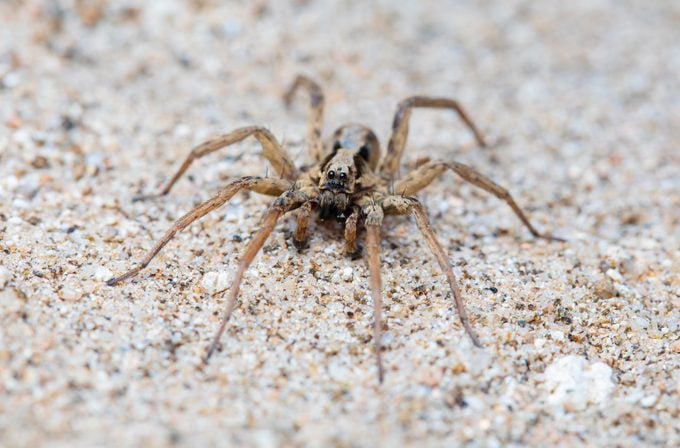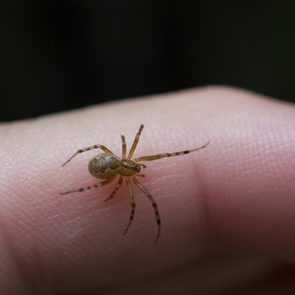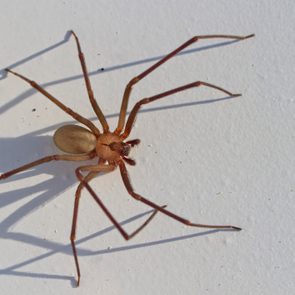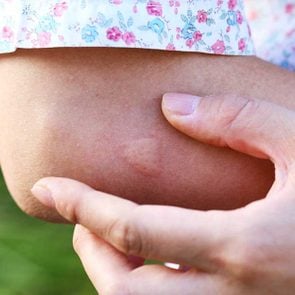Wolf Spider Bites: Everything You Need to Know
Updated: Nov. 04, 2020
Wolf spiders have a menacing hairy appearance, but they rarely bite. Here's why—and what else you should know about them.

If you’ve never seen a wolf spider (Lycosa) and wonder what they look like, imagine a mini tarantula, with its robust, hairy body. They range from as small as 1/4 inch to about 1.5 inches long. They tend to live outdoors throughout the United States. When they’re not hunting, they hang out under rocks and other objects close to the ground or burrow in the soil.
What about the spider’s bite? You’ll be happy to know that wolf spiders rarely bite—and that’s for one good reason.
What to know about wolf spiders
“Wolf spiders are kind of like regular wolves. Most species don’t use webs to hunt. Instead, they journey around at night, hoping to find food to pounce on,” explains Sebastian Alejandro Echeverri, PhD, a spider specialist at the University of Pittsburgh. That food isn’t human skin or blood. Wolf spiders hunt ground-dwelling insects, like ants and grasshoppers. They also feast on other spiders; sometimes larger wolf spiders will feast on small amphibians or reptiles.
As a nocturnal spider, they are equipped for night vision the same way other nocturnal animals are. “They have what are essentially mirrors on the back of their eyes,” says Echeverri. “The mirrors bounce light back through the eye, giving the animals’ retina a second chance of detecting each bit of light. This is why the eyes of dogs, cats, and yes, wolf spiders seem to glow when you shine a light on them,” he explains. And speaking of eyes, wolf spiders have eight of them—two rows of four eyes. The upper level has two large eyes in the middle that point forward while the other eyes located further back.
How do I avoid getting bitten?
Wolf spiders rarely bite, something that’s true of spiders in general. If they do bite, it is for self-preservation. “Spiders only bite people if they feel that they have no other way to save their own lives,” says Echeverri. That scenario might be if the spider was trapped between you and an object and couldn’t escape. “Their first response to a human is to hide and/or run away. I’ve handled over a thousand spiders, and never been bitten.”
Wolf spiders typically stay outdoors but might be seen indoors as the temperatures drop in late summer and early fall. Still, you’re not likely to get bitten because whether they’re indoors or outdoors, spiders scurry away when they sense a human. Since they rarely bite and the bite isn’t known to be toxic, you might want to keep them around to kill the bugs in your house. If not, use sticky traps low, near doors, corners, and walls to trap them.
https://www.instagram.com/p/B1pt7RkFFh_/
What are the symptoms of a wolf spider bite?
Given the wolf spider’s size, the bite might hurt, but it’s not likely to be excruciating pain. It’s more like a bee sting. “You might see a little reddish bump and some minor swelling,” says Joseph Zahn, MD, a dermatologist and assistant professor of dermatology at George Washington University Medical Faculty Associates in Washington, D.C. “Unlike a few other species of spiders, these rarely cause significant systemic problems or symptoms. For the most part, just localized pain, itching, and minor swelling,” says Dr. Zahn.
I think a wolf spider bit me: What now?
There’s little cause for concern if a wolf spider bites you. “For the most part, these bites rarely pose a risk to your health,” says Dr. Zahn. Wolf spiders have venom like the black widow and brown recluse, but it isn’t considered toxic to humans. As a matter of fact, the vast majority of spider venom doesn’t affect humans medically because it was meant to kill spiders’ prey, not humans. Spiders in general avoid using their venom. “The spider would rather conserve its venom for its next insect meal. That venom is valuable—it takes a lot of energy to make, and the spider needs it to catch its food” says Echeverri. The wolf spider bite is virtually harmless.
What will treatment be like?
Spider bite treatment protocol can be done at home. “If you experience fevers, chills, muscle pain, and aches, or other systemic symptoms, call your doctor,” advises Dr. Zahn.
- Clean the bite with soap and warm water.
- Apply ointment-based moisturizer to damp skin and keep covered with an adhesive bandage.
- Take ibuprofen or acetaminophen (unless you have a condition where you should avoid them) if you have pain.
- Use hydrocortisone 1 percent cream or briefly apply ice to manage itching.
Next up: Learn more about all kinds of spiders and their bites.
























